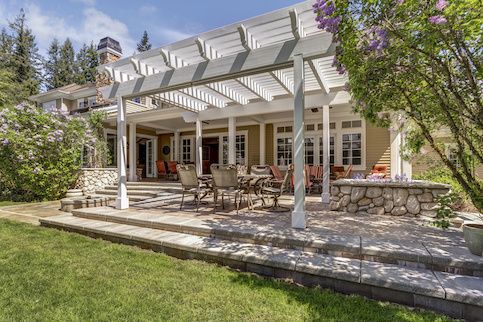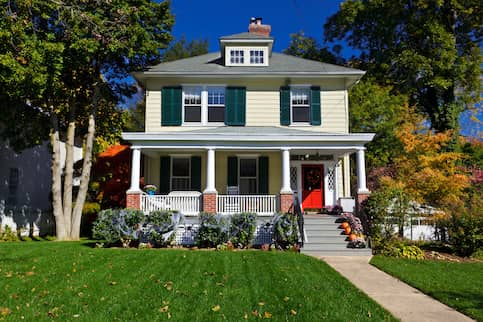Buying a home is often the biggest purchase that an individual will make within their lifetime and with such a big purchase comes forth many important questions. Location, home style and budget are all very crucial factors to consider when purchasing your home. There’s another important factor to think about when you’re ready to purchase: the best loan to buy a house based on your goals.
What Is The Best Mortgage Loan?
Before jumping into the different loan types, it’s important to understand what a mortgage is. Mortgages are loans provided to borrowers from either a mortgage lender, bank or other financial institution to purchase or refinance a home. A mortgage uses the home as collateral that the lender can take possession of if the borrower fails to repay the loaned amount and interest.
It’s important to understand that there are many types of mortgage loans available when purchasing a home. Each loan comes with its own pros and cons along with different loan qualifications. Due to these factors, the best mortgage loan is ultimately the one that fits your financial situation and needs the best. While one mortgage loan type may be ideal for one borrower, it may not fit the specific needs and situation for another.
See What You Qualify For
Buy A Home
Discover mortgage options that fit your unique financial needs.

Refinance
Refinance your mortgage to have more money for what matters.
Tap Into Equity
Use your home’s equity and unlock cash to achieve your goals.
Types Of Mortgage Loans, Compared
Here is a quick visual guide to some of the most common types of mortgage loans offered and their specifics. It’s important to note that some figures may vary between lenders. These include the minimum credit score and mortgage insurance.
Loan Type | Overview | Upfront Fees | Minimum Down Payment | Minimum Credit Score | Mortgage Insurance |
|---|---|---|---|---|---|
FHA Loan
| Government-insured and ideal for borrowers with lower credit scores | Mortgage Insurance Premium (MIP) equal to 1.75% of loan amount | 3.5% | 580 | Required regardless of down payment – 0.15% – 0.75% of loan balance |
USDA Loan | Used to purchase homes in designated rural areas | Guarantee Fee equal to 1% of loan amount | 0% | 640 | .35% of remaining loan balance |
VA Loan | Those in active duty, veterans and surviving spouses may be eligible | VA Funding Fee equal to 1.25% – 3.3% of loan amount | 0% | The VA does not require a min. credit score, though most lenders require 580-620 | None |
Conventional Mortgage | Most common type of mortgage, not backed by the government | N/A | 3%-5% | 620, though some lenders prefer higher | Required if less than 20% down payment – 0.1% – 2% of loan balance |
Jumbo Loan | Used to buy houses that sell for more than the conforming loan limit | N/A | 10%-20% | 680 or higher | May be required if less than 20% down payment, though it depends on the lender |
Adjustable-Rate Mortgage
An adjustable-rate mortgage (ARM) is a type of mortgage loan that allows you to have some variation in the interest rate that you pay. ARMs start with a fixed interest rate for a set period (usually for 5, 7 or 10 years). This fixed period, typically features a lower interest rate than fixed-rate mortgages. Once the fixed period ends, your interest rate may increase or decrease depending on the market.
ARMs include a rate cap which protects your interest rate from increasing too much in a short amount of time. Rate caps limit how much your interest rate can increase. An initial cap limits the first time a rate adjusts. A periodic cap limits the adjustment per period, while the lifetime cap limits the interest rate over the entire life of your loan. As rates continue to rise, your interest rate will only rise to the rate cap amount set for your loan.
Who Are Adjustable-Rate Mortgages Best For?
This type of mortgage rate type would be best for a borrower who is buying a starter home and/or planning on selling within a few years of purchasing it. ARMs are also well suited for those who have an flexible budget as the changing interest rates can cause changes in budgeting.
Advantages
- Low introductory rate for the first (5, 7, or 10 years)
- Access to low interest rates when the market rates fall without needing to refinance
Disadvantages
- After the fixed period, varying interest rates can cause budgeting issues as monthly mortgage payments may fluctuate
- When market interest rates rise, your interest rate will rise as well
Find out if an ARM is right for you.
See rates, requirements and beneifts.
Fixed-Rate Mortgage
There is also a fixed-rate mortgage loan, which is more common. The interest rate that you receive at the beginning of a fixed-rate loan stays the same for the entire life of the loan. The typical loan life for a fixed rate mortgage is 15 or 30 years. Since this mortgage rate will not change throughout the life of the loan, you need to refinance to get a new rate.
Mortgage rates are determined by many factors. The first of which is the market rate at the time of your loan application. Whether market rates are on the rise or fall, your rate will be reflective of this. The rate that you’re given is also affected by personal factors, such as your credit score and down payment amount.
Who Are Fixed-Rate Mortgages Best For?
Fixed-rate mortgages are best for borrowers who don’t mind having a consistent rate for the life of their loan. This is especially beneficial if you can lock in a low interest rate. Potential home buyers who plan on staying in the home long term and want the stability of a more predictable payment would be the ideal borrower for this type of home loan.
Advantages
- Due to the consistent interest rate, principal and interest payments will also stay consistent, which allows for better budgeting.
- You won’t need to worry about your rate increasing.
Disadvantages
- If the market rates fall to below your interest rate, you’ll need to refinance in order to acquire the lower rate.
- Fixed-rate mortgages do not have the same low introductory rate that ARMs have.
Conventional Loans
Conventional loans are a type of loan that is not insured or backed by a federal agency such as the U.S. Department of Agriculture (USDA), the U.S. Department of Veterans Affairs (VA) or the Federal Housing Administration (FHA). These loans are eligible to be sold to government sponsored entities (GSEs), such as Fannie Mae or Freddie Mac and adhere to conforming loan limits.
To qualify you for a conventional mortgage, your lender will review a few different things, namely your financial information including your credit score, down payment and debt-to-income ratio (DTI).
Credit score: Minimum credit scores may vary per lender, but the typical score needed to approve a conventional loan is 620. Keep in mind, a lower credit score may mean a higher interest rate, whereas a higher score may offer more favorable terms.
Down payment: When it comes to conventional loans the minimum required down payment is 3% of the home’s sale price. However, your required down payment will depend on your personal situation and the type of loan or property you’re getting. Ultimately, the larger the amount of money you can put down, the less money you’ll need to borrow and the more equity you’ll have in the home.
DTI: Lastly, lenders will look at your debt-to-income ratio, which is a measure of how much of your monthly gross income is taken up by any debts that you may have. Generally, lenders look for a maximum debt-to-income ratio of 50% for conventional loans.
Who Are Conventional Loans Best For?
Conventional loans are best suited for borrowers who meet the criteria of a credit score of 620 or higher and do not have a debt-to-income ratio over 50%.
Advantages:
- No upfront mortgage insurance premium unlike FHA loans
- Ability to use this type of loan for secondary homes and investment properties
- Opportunity for a lower down payment
Disadvantages:
- Tougher qualifications may make it harder to be approved for this loan
- You cannot borrow more than the conforming loan limit. In 2023, that limit is $726,200 for a single-family residence in most areas of the U.S. and $1,089,300 for high-cost areas like Alaska and Hawaii.
Jumbo Loans
Next, we have the jumbo loan. Jumbo loans are non-conforming loans (unsellable to Fannie and Freddie) that are typically used to buy homes that have a purchase price higher than the conforming loan limit.
As with the typical conventional loan, jumbo loans feature the same set of criteria to be looked at by your lender. However, due to the large amount of money and larger risk to your lender, there is a higher degree of scrutiny than the normal conventional loan. This means a higher minimum credit score requirement (at least 680) and a lower DTI will be needed to qualify. Furthermore, jumbo loans require a larger down payment (typically 10% – 20% of the purchase price) than what is needed for a conventional mortgage loan.
Who Are Jumbo Loans Best For?
A jumbo loan would be ideal for a borrower who is trying to purchase a home with a selling price is higher than the conventional limit for the area. The potential home buyer would have a credit score of 680 or higher along with a low debt-to-income ratio and a larger down payment.
Advantages
- Interest rates are comparable to standard conventional mortgages
- Allows the ability to purchase a more expensive home
Disadvantages
- Requires a large down payment
- Stricter qualifications make approval more challenging
Find out if an FHA loan is right for you.
See rates, requirements and benefits.
Government-Insured Loans
There are three main types of government-insured loans:
FHA loans offer the opportunity to qualify with a lower credit score. Some lenders allow applicants to have a credit score as low as 500. However this will come with a higher down payment (typically 10%). Most lenders require a credit score of 580 or higher. The higher the credit score the better the terms of the loan. With FHA loans, you’ll be required to pay MIP.
USDA loans are used by those looking to purchase a house in a designated rural area and don’t require a down payment. USDA loans come with unique stipulations such as the location of the home being purchased and limits on household incomes in relation to that area.
VA loans are only available to active service members of the United States military along with veterans and eligible surviving spouses. VA loans are unique as they do not require a down payment on the home and there is no minimum credit score required by the VA. However, lenders may have their own qualifying credit score in place – usually 580.
Who Are Government-Insured Loans Best For?
Government-insured loans are best for those who fit the unique qualifications that come with these loan types. For USDA loans, the ideal borrower would be a home buyer looking for a house in a rural area. VA loans would be best for veterans, surviving spouses and active service members. Lastly, FHA loans will be ideal for those looking to purchase a home but do not have “spectacular” credit.
The Bottom Line: The Best Loan For A House Varies From Person To Person
So, what’s the best loan to buy a home? Ultimately, that solely depends on your unique needs and situation. It’s important to research each loan type and see which one fits your financial situation, the type of home you want and your individual goals.
Find A Mortgage Today and Lock In Your Rate!
Get matched with a lender that will work for your financial situation.

Dylan South
Dylan is a graduate of Eastern Michigan University where he studied political science and history. Through these studies he found a deep interest in writing. Dylan and his fiancee Liss are new parents, and they welcomed their first child, a daughter, in October of 2022. Dylan considers every day to be an adventure and he cannot wait to share his sense of wonder and love of life with his daughter.












